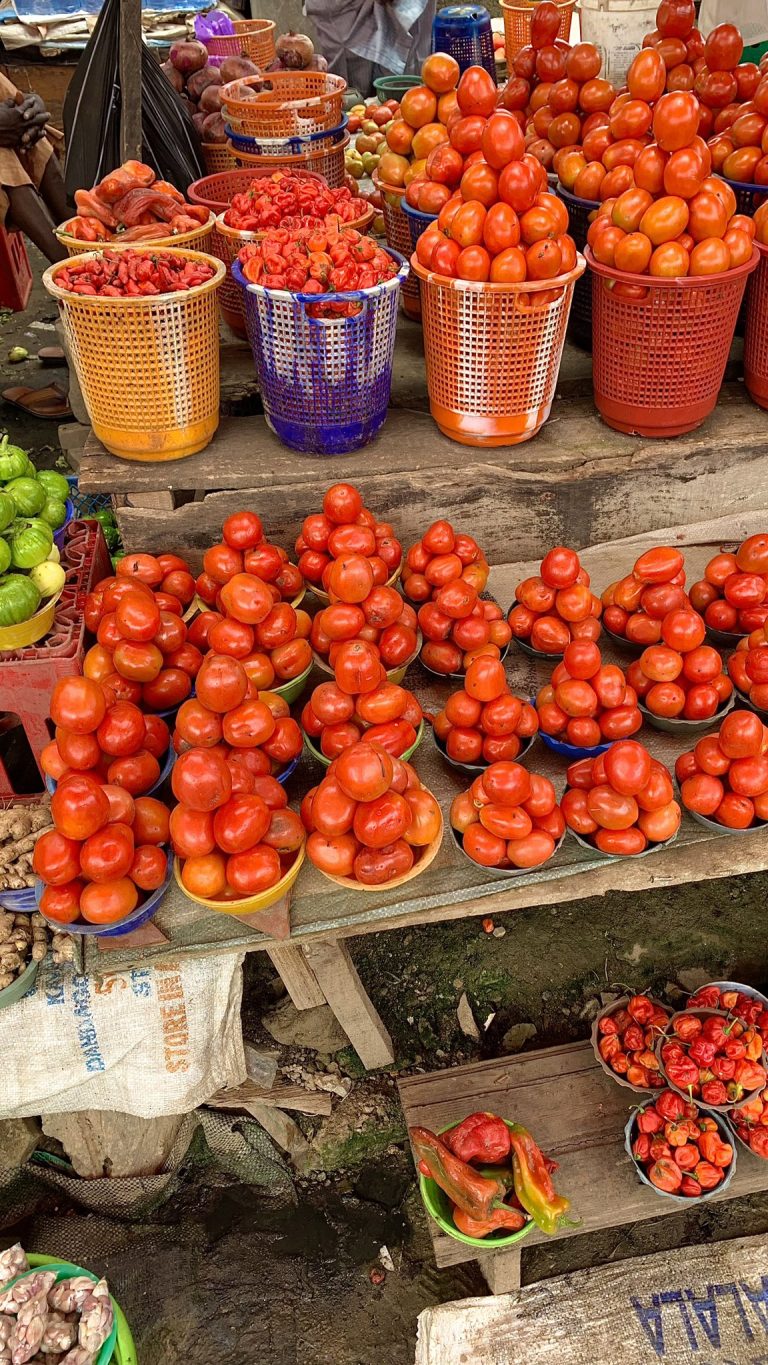On a sun-drenched afternoon in Mandate Market, Ilorin, Azeezah Opeyemi, a 27-year-old shopper, arrived with high hopes of purchasing a basket of tomatoes. What she encountered was a harsh reality: the price of tomatoes had skyrocketed, far beyond her expectations.
This experience is becoming all too common across Nigeria, where the cost of tomatoes has soared due to climate change, seasonal challenges, and economic factors.
The high cost of tomatoes and its impact
Azeezah’s visit to Mandate Market was met with disappointment. Once affordable, the price of a big basket of tomatoes had jumped from ₦18,000 in January to a staggering ₦64,000 to ₦66,000 by the time she arrived in June.
“Although I anticipated some increase due to inflation and climate impacts, the current prices are beyond what I imagined,” Azeezah said. Her frustration mirrors the sentiments of many Nigerians grappling with the soaring cost of this essential food item.
Tomatoes are a staple in Nigerian cuisine, and their rising cost is hitting consumers hard, even in regions traditionally known for lower produce prices. In Northern Nigeria, where tomatoes and peppers are typically more affordable, residents like Ibrahim Saidu from Suleja are feeling the pinch. This is because they have had to reduce their budgets on tomatoes so that they can maintain their general expenses.
Visiting Ibrahim Babangida Market, the largest in Suleja Local Government Area, Ibrahim was forced to adjust his budget. “A small paint rubber of tomatoes that used to cost ₦1,500 to ₦2,000 has shot up to ₦8,000. Even pepper has jumped from ₦700 to ₦4,000,” Ibrahim lamented. “I always thought tomato prices here should be lower, but the opposite is happening, and it’s shocking.”
Read Also: Cholera: Katsina records 118, Kaduna, Kano zero cases – Reports
For students like Ahmad Adam at Usmanu Danfodiyo University in Sokoto, the situation is particularly dire. “At the university’s mini market, three pieces of tomatoes now sell for ₦200, and six pieces of pepper for ₦100,” he said. “It’s shocking to see prices this high. I’ve had to start using tomato paste because fresh tomatoes have become too expensive.”
Traders struggle with costs and consumer blame
Tomato traders, often the first to feel the brunt of consumer frustration, are also struggling. They face high purchase prices from farmers and difficult growing conditions during the rainy season.
In Sokoto, Garba Aminu, a tomato dealer at Kasuwar Hajiya Halimah, detailed the significant price hikes. “Earlier in 2024, a basket of tomatoes sold for ₦30,000 to ₦47,000. Now, it’s between ₦100,000 and ₦120,000,” Garba said. “A bag goes for ₦120,000, while smaller quantities cost ₦40,000 to ₦50,000. The farmers are struggling with pest infestations, which drives up the prices.”
Garba emphasized that the high prices are not due to traders’ greed. “The prices we charge are a reflection of what we pay farmers. We’re not profiting excessively; we’re just trying to stay afloat.”
In Kwara State, Adebayo Faruq, a dealer at Oja Tuntun market in Ilorin, echoed similar concerns. “The rainy season has been harsh on farmers, especially with heavy rainfall in June. This disrupts tomato farming and leads to scarcity and higher prices. The rains bring pests that damage the crops, further reducing supply.”
Tomato disease poses fresh to accelerating inflation – Agriculture Minister
The sharp rise in tomato prices is part of a broader crisis in Nigeria’s food sector, driven by economic factors and environmental challenges. The Minister for Agriculture, Muhammad Abubakar recently highlighted the issue on social media, attributing the rising costs to a severe outbreak of tomato ebola, caused by moth-like insects.
He disclosed that the government has deployed teams to combat this pest and support affected farmers.
Mira Mehta, CEO of Tomato Jos, a Nigerian agribusiness on her X (Twitter) page, also pointed to climate and seasonal changes as key factors. “Tomatoes are seasonal worldwide. They thrive in cool nights, hot days, and dry climates. The rainy season in Nigeria makes it difficult to grow open-field tomatoes,” she explained. “Every year, prices spike in June due to these conditions.”
Coping with the crisis: adaptation and resilience
Consumers and traders alike are finding ways to adapt to the high prices. Some are turning to alternatives like tomato paste, while others are buying in smaller quantities or offering credit to maintain customer loyalty.
Despite these efforts, the surge in tomato prices is a stark reminder of the broader challenges facing Nigeria’s agricultural sector. The combined impact of climate change, pest outbreaks, and economic pressures is creating a perfect storm that affects every link in the supply chain, from farmers and traders to the everyday consumer.


